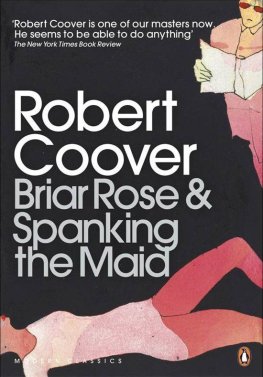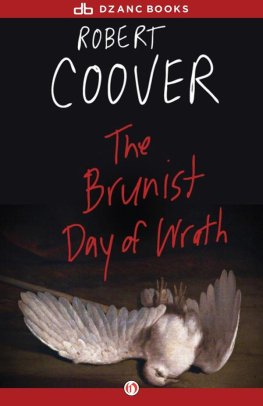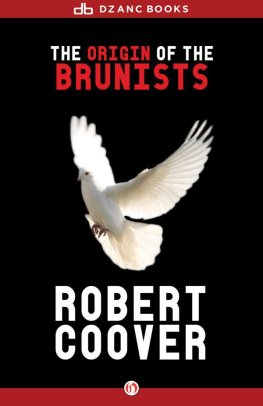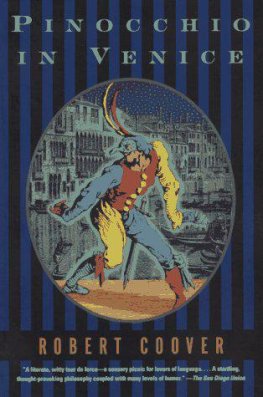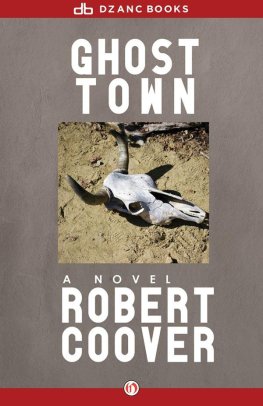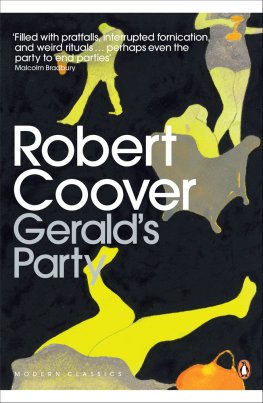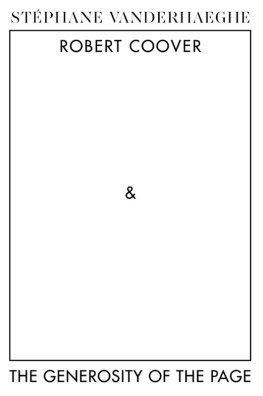Robert Coover
Briar Rose & Spanking the Maid
Robert Coover is one of Americas finest stylists, a master of elegant nuance, subtle intent and darkly subversive humour. His abiding theme, strongly discernible in these two wonderful novellas, is the gap that lies between our notions of the world and the worlds stubborn and consternating reality, and, further, the way in which that reality keeps on slyly asserting itself through the intricate elaborations of myth and fairy tale. A self-conscious artist, fully aware of his vocation and ruefully accepting of its demands, he is that rarest of things, a poet in an age of prose.
Nowhere is his artistry more in evidence, and the price it exacts more amply accepted, than in Spanking the Maid. Fashioned in the form of an eighteenth-century handbook of sado-masochist techniques There are manuals for this it is a metaphor, exact and exhausting, of the long and painful process by which a work of art is brought into quivering existence. Any reader who cares to know just what it is like to write a novel will be well instructed here, and will come away from the experience suitably chastened, cheeks aglow from a lesson expertly administered.
As with writing, it is the relentlessness of the chastisers enterprise that impresses, the grinding daily repetition of an action that may have started out in frenzies of desire and delight but that has hardened into the dull toils of a duty deeply resented but wholly unshirkable. The maid enters her masters bedroom anew each morning with her mop and bucket, broom, rags and brushes, determined that today she will perform every last little chore correctly, with rigorous exactitude, so that the man waking groggily in his bed from yet another night of confused and painful dreaming will be pleased with her, entirely pleased, and this time will not have to make her bend over and thrash her bared bottom until the welts spring up and blood is drawn.
How did it all begin, he wonders. Was it destiny, choice, generosity? If she would only get it right for once, he reasons, bringing his stout engine of duty down with a sharp report on her brightly striped but seemingly unimpressionable hinder parts, he might at least have time for a stroll in the garden.
But perfection, as we know, is not of this world, and probably not of any other, either. The master as much as the maid is a captive of dire circumstance. He is not a free man, his life is consecrated, for though he is her master, her failures are inescapably his. As Samuel Beckett, surely one of Coovers exemplars, has it: Ever tried. Ever failed. No matter. Try again. Fail again. Fail better.
Coover has much fun with his long-suffering pair, master and maid, writer and writing, artist and artefact. He has discerned the comical absurdity that is the worm in the bud of all erotic works, and tweezers it out for our amused inspection. The very idea of the artist belabouring the backside of his cowering, flawed creation is a cause for laughter, not all of it unkind, for even as we laugh we cannot but feel for the poor fellow, harassed, still half asleep and plagued by the monstrousness engendered by his unceasing struggle to get it right. The fleurs de mal of his creation are discovered each day when the maid throws back the bedcovers: Things that oughtnt to be there, like old razor blades, broken bottles, banana skins, bloody pessaries, crumbs and ants, leather thongs, mirrors, empty books, old toys, dark stains. Just as daffodils and skylarks, so are such lowly things as these the stuff of art.
In Briar Rose the hero, as we must call him, is also bound to an endless and thankless task. The work is a set of variations, Bachian in grace and Beethovinian in vigour, on the legend of Sleeping Beauty, called here Briar Rose. This time the subject is not art although the art of story-telling is everywhere probed and tested, challenged and mocked but the nature of romantic love. It is about much else besides, of course, much, much else, for all true works of art are myriad-minded.
This obsessional roundelay too is funny, like Spanking the Maid, only funnier. Now the gap between what appears to us to be the case and what actually is becomes a chasm from which dark laughter rises. The hapless prince for all his energies is every bit as entranced and trapped as the sleeping object of his desire. Here we find him thrashing fruitlessly amidst the forest of briars that rings the castle where the enchanted damsel lies in expectation of his coming:
Though he no longer even wishes to reach her, to wake her, he continues, compelled by vocation, to slash away at his relentless adversary, whose deceptive flowers have given the object of this quest the only name he knows. Though she remains his true love, salvation and goal, the maker of his name, jewel at the core, and all that, he cannot help but resent her just a little for getting him into this mess, which is probably fatal.
There is not one prince but many, all of them aspects of the dreaming girls hopes, desires, misgivings, fears. In one manifestation she cannot distinguish him from her father, in another he is the wicked fairy in disguise. In dream she senses his hands upon her, tenderly seeking out her secrets, then realizes that what she feels is not the touch of princely fingers but of the countless claws of the vermin that over the long years have come to nest in her chemise And even when Charming does succeed in hacking his way through the walls of briar and penetrating the castle to where she lies, the momentous moment turns out to be a let-down. My prince! You have come at last! Yes, well, it was a matter of honour, he said gravely, disappointing her. I did it for the love of love.
These two little texts, that bear themselves with such seeming lightness, have the dark resonance of folk-tales and the artful self-consciousness of modernist myth-making. The word classic is much abused, but in this instance it is entirely apt. Coover is a magician, and these are his spells.
John Banville
BRIAR ROSE & SPANKING THE MAID
for Pili & all her magic tricks
He is surprised to discover how easy it is. The branches part like thighs, the silky petals caress his cheeks. His drawn sword is stained, not with blood, but with dew and pollen. Yet another inflated legend. He has undertaken this great adventure, not for the supposed reward what is another lonely bedridden princess but in order to provoke a confrontation with the awful powers of enchantment itself. To tame mystery. To make, at last, his name. Hed have been better off trying for the runes of wisdom or the Golden Fleece. Even another bloody grail. As the briars, pillowy with a sudden extravagance of fresh blooms, their thorns decorously sheathed in the full moonlight, open up to receive him as a doting mother might, he is pricked only by chagrin. Yet he knows what it has cost others who have gone before him, he can smell their bodies caught in the thicket, can glimpse the pallor of their moon-bleached bones, rattling gently when the soft wind blows. That odor of decay is about the extent of his ordeal, and even it is assuaged by the fragrances of fresh tansy and camomile, roses, lilac and hyssop, lavender and savory, which encompass him affectionately perhaps he has been chosen, perhaps it is his virtue which has caused the hedge to bloom as he plunges deeper into the thicket, the castle turrets and battlements already visible to him, almost within reach, through its trembling branches.
She dreams, as she has often dreamt, of abandonment and betrayal, of lost hope, of the self gone astray from the body, the body forsaking the unlikely self. She feels like a once-proud castle whose walls have collapsed, her halls and towers invaded, not by marauding armies, but by humbler creatures, bats, birds, cats, cattle, her departed self an unkempt army marauding elsewhere in a scatter of confused intentions. Her longing for integrity is, in her spellbound innocence, all she knows of rage and lust, but this longing is itself fragmented and wayward, felt not so much as a monstrous gnawing at the core as more like the restless scurry of vermin in the rubble of her remote defenses, long since fallen and benumbed. What, if anything, can make her whole again? And what is whole? Her parents, as always in her dreams, have vanished, gone off to death or the continent or perhaps to one of their houses of pleasure, and she is being stabbed again and again by the treacherous spindle, impregnated with a despair from which, for all her fury, she cannot awaken.

